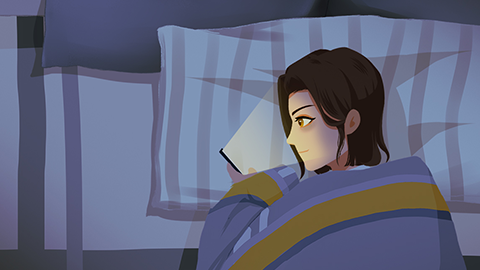Why do I feel dizzy and lightheaded after staying up late?
Generally, the causes of dizziness and blurred vision after staying up late may include lack of sleep, excessive fatigue, anemia, cervical spondylosis, hypertension, and other conditions. Symptomatic treatment such as general therapy or medication may be needed. If discomfort occurs, it is recommended to seek medical attention promptly and undergo appropriate treatment under a doctor's guidance. Detailed explanations are as follows:

1. Lack of Sleep
Prolonged staying up late may cause sympathetic nerve excitement, thereby affecting cerebral blood supply. Changes in cerebral vascular pressure may cause symptoms of dizziness and vertigo, possibly accompanied by fatigue, difficulty concentrating, and dry, painful eyes. It is recommended to sit or lie down immediately to rest, avoid excessive physical activity, ensure adequate sleep, and avoid staying up late at night.
2. Excessive Fatigue
Excessive fatigue can lead to a decline in bodily functions. When the brain and eyes remain overworked without rest, symptoms such as dizziness and blurred vision may occur, possibly accompanied by physical weakness, difficulty concentrating, and memory loss. It is recommended to avoid overexertion in daily life and maintain a regular sleep-wake schedule to help restore bodily functions.
3. Anemia
Staying up late can interfere with the normal functioning of the digestive system, reducing the absorption of iron and protein, which may lead to anemia. In an anemic state, the oxygen-carrying capacity of red blood cells decreases, causing cerebral hypoxia and resulting in dizziness and blurred vision. Symptoms may also include pale complexion, palpitations, and shortness of breath. It is recommended to follow medical advice and use medications such as ferrous sulfate sustained-release tablets, ferrous fumarate tablets, or ammonium ferric citrate vitamin B1 syrup II to alleviate symptoms.
4. Cervical Spondylosis
Prolonged head-down posture or poor sitting posture can place additional pressure on the cervical spine, leading to cervical disc herniation or bone spur formation, compressing cervical nerve roots and blood vessels, affecting cerebral blood supply, and causing dizziness and blurred vision. This may also be accompanied by neck pain and arm numbness. It is recommended to follow medical advice and use medications such as chlorzoxazone tablets, eperisone hydrochloride tablets, or naproxen sodium tablets for treatment.
5. Hypertension
When staying up late, the body remains in a state of tension, leading to increased adrenaline secretion and elevated blood pressure. Long-term hypertension can damage blood vessel walls, reduce cerebral blood flow, cause dizziness and blurred vision, and may also cause headaches, chest tightness, and blurred vision. It is recommended to follow medical advice and use medications such as nifedipine tablets, methyldopa tablets, or captopril sustained-release tablets to alleviate symptoms.
It is recommended to avoid staying up late regularly, maintain sufficient sleep duration, and establish a regular sleep-wake schedule to promote overall health.
References
[1] Liu Yonghong. Can Sleeping In on Weekends Repay the "Health Debt" Caused by Staying Up Late? [J]. Food and Health, 2024, 36(10): 26-27.
[2] Sun Qingqian. Why Is Staying Up Late Harmful? [J]. Family Medicine, 2018, (11): 35.




